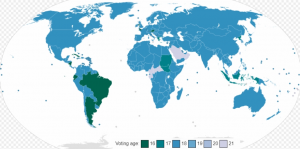A graph showing the nations in the world where the voting age is 18 and above is circulating online. The graph shows that Singapore is one of the only developed nations in the world where 18-year-olds are not able to vote and shows that Singapore is in the ranks of Middle-Eastern and African nations where the voting age is 21 and above.
In the graph below, the nations shaded in green have a minimum voting eligibility age of 16 or 17 and above while the nations shaded in blue have a minimum voting eligibility age of 18 and above.
Only a small minority of nations, Singapore included, is shaded in purple since the minimum voting eligibility age in these nations is 21 and above:


Singapore’s voting eligibility age of 21 and above falls in line with the past practice of the United Kingdom at the time independence was granted to Singapore, in 1965.
In 1969, the United Kingdom decided to lower the British voting age to 18. The US, Canada, West Germany and France followed suit and changed the voting age to 18 within the following five years.
Countries like India, Iran, Indonesia, the Philippines, Thailand, Cambodia and Australia have also lowered the voting age to 18 and Malaysia is due to vote on an amendment that would allow 18-year-old Malaysians to vote in elections.
Singapore, however, is not prepared to join the ranks of these nations. In Parliament this week, Minister for Trade and Industry Chan Chun Sing said that the Government will not lower the voting age since 18-year-olds may not be mature enough to make a big decision like a vote.
Mr Chan said that the current age remains the appropriate age for Singaporeans to make decisions and engage in “activities that involve significant personal responsibility.”
Asserting that the Government takes a “a graduated approach” in setting the legal ages “at which a person can undertake different responsibilities in Singapore,” Mr Chan said: “A person’s rights and responsibilities gradually increase as one matures until the common law age of majority of 21.”
These rights and responsibilities include voting in elections to select MPs and the President, which Mr Chan called “serious choices” that necessitate “experience and maturity.”
It is curious that youths in all developed countries are matured enough to vote but the Singapore Government does not seem to think its youths are mature enough to do so.
Because of the Government’s decision, an estimated 130,000 Singapore youths will be unable to vote in the next General Election.

